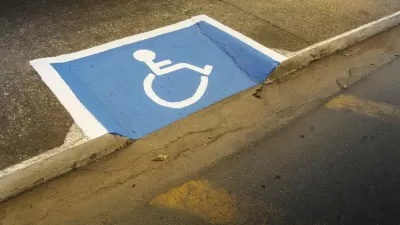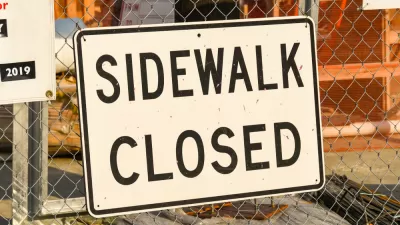The city of Seattle has finally been compelled to maintain pedestrian infrastructure in keeping with the Americans with Disabilities Act.
Ryan Packer reports that the city of Seattle settled a class action lawsuit in U.S. District court alleging that the city is violating the Americans with Disabilities Act, "based on the current number of intersections that are lacking proper curb ramps and the fact that many intersections have curb cuts that are substandard."
"Under the settlement, the Seattle Department of Transportation (SDOT) will be required to build 1,250 curb ramps every single year, adding up to a commitment to install 22,500 over the next 18 years," reports Packer. That pace will double the city's total number of curb cuts by the year 2035.
The article digs much deeper into the subject of curb cuts, their costs, and the lack of political will to construct the important feature of complete streets infrastructure (shown to benefit broad cross sections of the public). The court decision will also impact the spending allotments made from the Move Seattle levy, as approved by voters in November 2015 and planned in the draft Pedestrian Master Plan released in March 2017.
FULL STORY: Disability Rights Victory Means Curb Cut Deluge Coming

Alabama: Trump Terminates Settlements for Black Communities Harmed By Raw Sewage
Trump deemed the landmark civil rights agreement “illegal DEI and environmental justice policy.”

Study: Maui’s Plan to Convert Vacation Rentals to Long-Term Housing Could Cause Nearly $1 Billion Economic Loss
The plan would reduce visitor accommodation by 25% resulting in 1,900 jobs lost.

Why Should We Subsidize Public Transportation?
Many public transit agencies face financial stress due to rising costs, declining fare revenue, and declining subsidies. Transit advocates must provide a strong business case for increasing public transit funding.

Paris Bike Boom Leads to Steep Drop in Air Pollution
The French city’s air quality has improved dramatically in the past 20 years, coinciding with a growth in cycling.

Why Housing Costs More to Build in California Than in Texas
Hard costs like labor and materials combined with ‘soft’ costs such as permitting make building in the San Francisco Bay Area almost three times as costly as in Texas cities.

San Diego County Sees a Rise in Urban Coyotes
San Diego County experiences a rise in urban coyotes, as sightings become prevalent throughout its urban neighbourhoods and surrounding areas.
Urban Design for Planners 1: Software Tools
This six-course series explores essential urban design concepts using open source software and equips planners with the tools they need to participate fully in the urban design process.
Planning for Universal Design
Learn the tools for implementing Universal Design in planning regulations.
Smith Gee Studio
Alamo Area Metropolitan Planning Organization
City of Santa Clarita
Institute for Housing and Urban Development Studies (IHS)
City of Grandview
Harvard GSD Executive Education
Toledo-Lucas County Plan Commissions
Salt Lake City
NYU Wagner Graduate School of Public Service





























